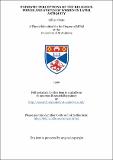Files in this item
Patristic perceptions of the religious power and status of women in later antiquity
Item metadata
| dc.contributor.author | Cloke, Gillian | |
| dc.coverage.spatial | 235 p. | en_US |
| dc.date.accessioned | 2018-06-04T14:36:59Z | |
| dc.date.available | 2018-06-04T14:36:59Z | |
| dc.date.issued | 1990-07 | |
| dc.identifier.uri | https://hdl.handle.net/10023/13702 | |
| dc.description.abstract | The role of women in the early Church has been the subject of a great deal of interest in recent times, with both feminists and those representing a more traditional outlook claiming substantiation for theories on the one hand of the alienation and 'de-naturizing' of women of conspicuous piety, on the other of their useful assimilation within a caring patristic outlook. This thesis will take an overview of women from various ranks of society pursuing different routes to accredited 'saintliness' and assess the relevance of some of these views. Holy women are known to us mainly through the voices of the Church Fathers; before observing later revisionist rhetoric, a survey of that pertaining at the time is a primary need. The eschatological mentality of the early Church coupled with a need for a post-Constantinian equivalent of martyrdom as the expression of ultimate commitment to Church over State to produce teaching on the necessity of a retreat from the physical and sexual aspects of life. I shall contend that this preaching was seen as of special application to women, by the perceived link between femaleness and physicality, and because of the Church's tradition of drawing women into commitments of anti-social implications. I shall consider how patristic teaching directed women to a heightened awareness of their sexual status, and that some sought to redress this by abstinence (especially vowed virginity and widowhood) while others sought to express their pious aspirations while accepting family life and burdens. I shall examine how consistent was the advice of patristic authors, both internally and with each other; and whether the consequences of their preaching led them into difficulties with their congregations. Further, how enthusiastically women took to this preaching; the problems they had with it; and the problems their men had with those women influenced by it. | en_US |
| dc.language.iso | en | en_US |
| dc.publisher | University of St Andrews | |
| dc.subject.lcc | BR195.W7C6 | en |
| dc.subject.lcsh | Women in Christianity--History--Early church, ca. 30-600 | en |
| dc.title | Patristic perceptions of the religious power and status of women in later antiquity | en_US |
| dc.type | Thesis | en_US |
| dc.type.qualificationlevel | Masters | en_US |
| dc.type.qualificationname | MPhil Master of Philosophy | en_US |
| dc.publisher.institution | The University of St Andrews | en_US |
This item appears in the following Collection(s)
Items in the St Andrews Research Repository are protected by copyright, with all rights reserved, unless otherwise indicated.

